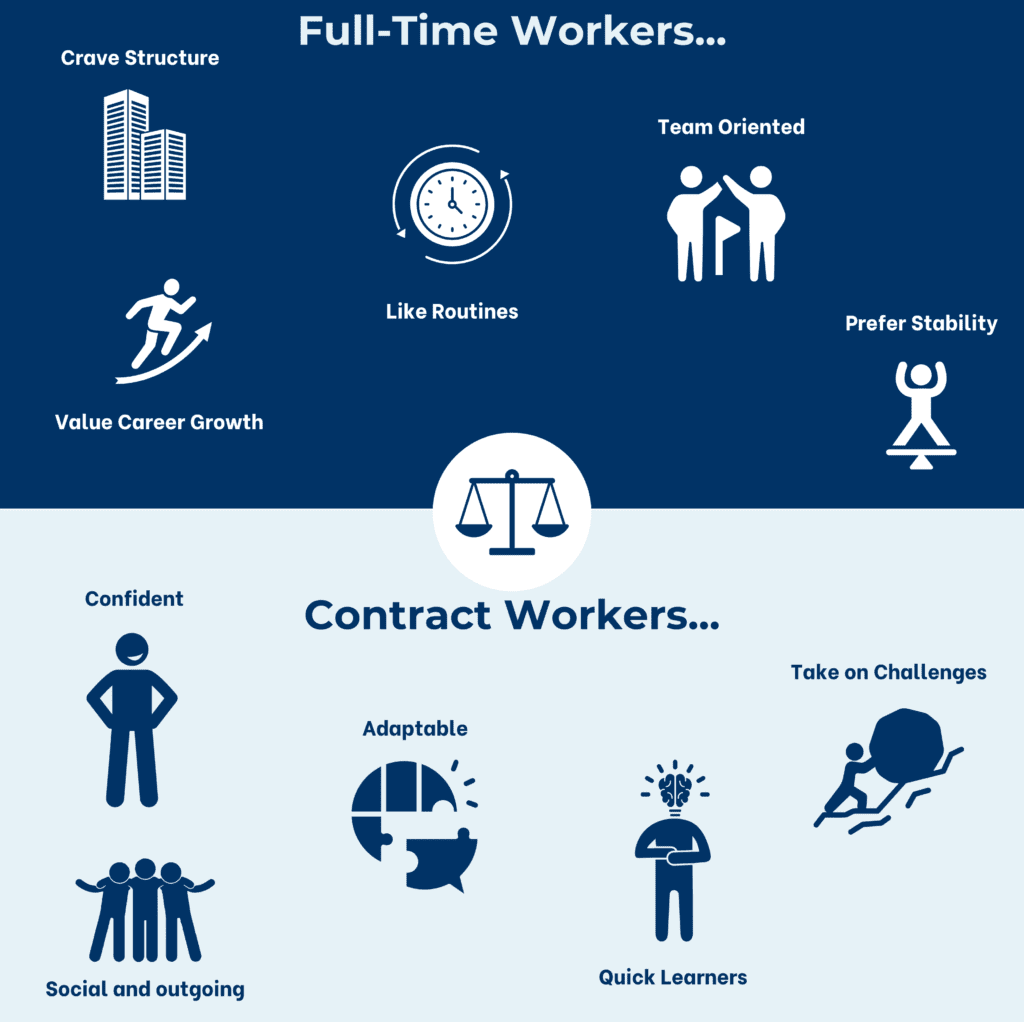Contract Jobs and Full-time Employment: Which One is For You?

In today’s fast-paced job market, job candidates are faced with an important choice: full-time employment or contract work. Both options come with their own set of advantages and challenges, and the right fit depends largely on your lifestyle, personality, and career goals. Understanding the key differences between these two types of work is essential, especially when it comes to job security, flexibility, compensation, and benefits. In this article, we’ll break down the lifestyle and career impacts of full-time versus contract work, helping job candidates make an informed decision about their future. Whether you're looking for stability or seeking more independence, you’ll learn which type of employment suits your needs and which personalities thrive in each environment. By the end of this article, job candidates will have a clearer picture of the work structure that aligns with both their professional ambitions and personal preferences.
What is Full Time Employment?
So, full-time employment usually means working around 30-40 hours a week. This isn't just about the hours, though—it’s also about the perks and job security that come with it. You get that steady routine (hello, predictable paycheck!) and a whole range of benefits that part-timers or contractors might not get. Let’s dive into the key parts of what makes full-time work… well, full-time.
Standard Hours and Benefits for Full Time Employment
Most full-time jobs fall between 35 and 40 hours a week. For the IRS, it's about 32 to 40 hours, and once you hit those hours, you’re eligible for benefits like health insurance under the Affordable Care Act. Full-time roles also come with things like paid time off (PTO), sick days, and retirement plans. These benefits can seriously make life easier, especially when you’re planning for the long haul.
Legal Protections and Overtime Pay
On top of all that, full-time employees get certain legal protections. Under the Fair Labor Standards Act (FLSA), you’re entitled to overtime if you work more than 40 hours in a week. This is great because it means you're getting compensated for the extra time you put in, instead of just burning out for no extra pay.
Another benefit of full-time roles? Job security. You’re less likely to face sudden layoffs or income gaps compared to part-time or contract workers. You can focus on building a career, knowing there’s stability in the background.
Expert Insights: Who's Best Suited for Full-Time Employment?
Full-time jobs are great for people who like structure, predictability, and the security of knowing where you’re going. If you’re someone who thrives in a consistent, routine-driven environment, full-time work might be your jam. If you love taking on challenges, value stability, like to follow the rules, and work within company structures, full-time employment might be the right route for you!
What Is Contract Work?
Contract work is kinda the opposite of a full-time gig. Instead of committing to a long-term job with set hours and benefits, you're hired for a specific project or task, with a set timeline. You get to do the work, get paid for it, and once it’s done, so is the job. It’s pretty straightforward, but there are some key things to know about how it works.
Contract Work Structure and Pay
When you’re a contract worker, your employment is temporary—usually to fill a need or get a specific task done. The scope of work is pretty clear upfront: you're hired for your specialized skills because the company needs something done that they don’t have in-house. The compensation can vary: sometimes it’s an hourly rate, sometimes it’s a flat fee for the project, depending on what you and the company agree on before you start. But here’s the kicker: contract workers don’t get benefits like health insurance, paid time off, or retirement plans. And you're on your own for things like taxes and insurance.
Like, imagine a company needs an app developer for a 3-month project. They hire a contract worker, pay them a set rate, but that worker won’t get the same perks as a full-time employee, like PTO or health benefits. It’s a pay-for-task deal, which can be great if you’re all about that short-term hustle.
Perks of Being a Contract Worker
One of the best things about contract work is how much control you have over your schedule. You’re usually free to work when you want (as long as you hit deadlines) and where you want. No set office hours. If you’re a freelancer or an independent contractor, it’s all on you: you choose what projects you want to take on and how you want to tackle them. It’s a good fit for people who want to be their own boss and aren’t into rigid schedules or long-term commitments.
If you’re someone who loves a mix of creative problem-solving and new challenges, this type of work could feel pretty freeing. You don’t have the same day-to-day grind of a full-time job, and you get to jump between projects, which keeps things from feeling stale.
Expert Insights: Who Does Well in Contract Jobs?
Okay, so contract work isn’t for everyone. But if you’re someone who thrives on variety and new challenges, you’ll probably love it. You also need to be self-motivated. Contractors are basically their own bosses. If you can stay productive without someone micromanaging you, you’re set. If you love working independently and solving problems on your own, you would do really well in this kind of setup.
Then there’s the need for good communication. You’ve gotta keep your network strong and relationships fresh, especially since you're usually working with different people all the time. Extroverts tend to thrive here, but really, anyone who’s good at connecting with others and staying in touch will do fine.
Finally, contract work involves a little risk—no steady paycheck or job security. So if you’re okay with some uncertainty and like the freedom to explore different opportunities, it might be a good fit.
Which One is the Right Fit For Your Personality?

The lifestyle of a contract worker differs from that of a full-time employee in key ways. Full-time employees typically work 35-40 hours per week with set schedules and benefits like health insurance and retirement plans—85% have access to employer-sponsored health benefits. They enjoy greater job security, with an average tenure of 4.1 years. In contrast, contract workers often have more control over their hours and enjoy greater flexibility—77% report being satisfied with this aspect. However, they face more uncertainty and don’t receive benefits, though they often earn 17.6% more per hour than full-time workers.
While full-time employees generally have clearer boundaries between work and personal life, 68% of contractors report better work-life balance. Contractors also have the flexibility to choose projects, but they must manage their own development. 65% invest in skills to stay competitive, with 79% feeling more employable because of their diverse experiences. Full-time employees, however, often have more structured career growth opportunities, with 74% believing their company offers ways to learn and grow.
Personality plays a big role in determining which type of work fits best. Contract work is ideal for those who are independent, risk-tolerant, and enjoy variety—ENTPs, ESTPs, and ENFPs often thrive here. Full-time roles, on the other hand, suit those who prefer stability, routine, and long-term career growth, like ISTJs and ISFJs. Ultimately, whether you choose full-time or contract work depends on your career goals, lifestyle preferences, and personality. If you don't know your personality type, take this quiz! Not only will it help you discover which work style suits you better, but it will also reveal more about yourself you might not be aware of!
Final Summary
- Full-time employment offers stability, benefits, and clear career growth. Employees enjoy job security, structured schedules, and comprehensive perks like health insurance and retirement plans.
- Contract work provides more flexibility, higher pay rates, and diverse experience across industries, but comes with less stability and no benefits.
- Personality plays a huge role in which work style fits best—full-time roles tend to suit those who crave routine and long-term career development (think ISTJs and ISFJs), while contract work appeals to those who value flexibility, variety, and independence (like ENTPs, ESTPs, and ENFPs).
- The choice between full-time or contract work ultimately depends on your personal preferences, career goals, and how much risk you're willing to take.
So, which lifestyle suits you best? Whether you’re looking for job security or the freedom to explore new opportunities, your work style and personality will guide you toward the right path. If you're ready to take the next step in your career, consider how your strengths align with your work options, and dive into a role that fits your needs.
Work With Integrus Solutions
If you're thinking about transitioning to a new job or role, Integrus Solutions can help you navigate your options. Whether you’re interested in full-time employment or contract opportunities, we have the expertise to match you with the right fit.
Contact us today or call us at (832) 483-3101 to discuss how we can help you find the ideal career path!
